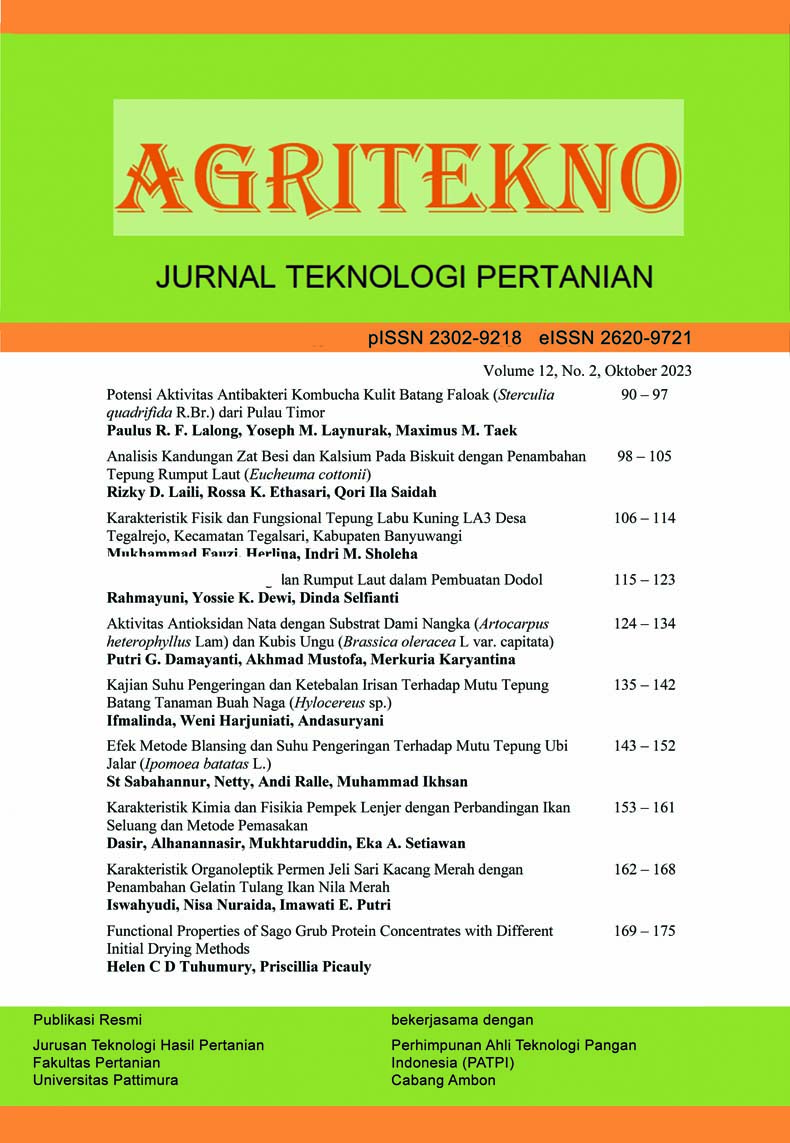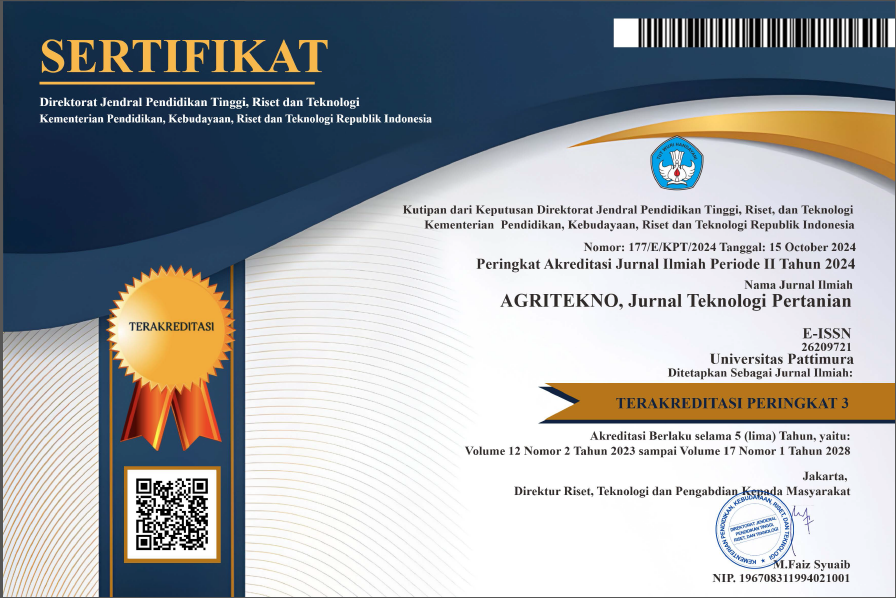Karakteristik Fisik dan Fungsional Tepung Labu Kuning LA3 Desa Tegalrejo, Kecamatan Tegalsari, Kabupaten Banyuwangi
Physical and Functional Properties of LA3 Pumpkin Flour From Tegalrejo, Tegalsari, Banyuwangi Regency
Abstract
LA3 pumpkins are one of the pumpkin variants cultivated in Indonesia, especially in Tegalrejo, Tegalsari Districts, Banyuwangi Regency. LA3 pumpkin production is relatively high, however, its utilization is still low. The waste of LA3 pumpkin pulp is relatively high because farmers only take its seeds. In the origin, during harvest time, LA3 pumpkins are harvested and stored for two weeks before taking its seeds, while the whole pumpkin can be stored for up to three months. After two weeks the pumpkin will be cut open and take their seeds, this action will reduce the pumpkin’s shelf life. However, increasing the LA3 pumpkin’s shelf life can be done by milling the pulp into flour. This study aimed to determine the physical and functional characteristics of LA3 pumpkin flour from the pumpkin that has been stored. In this study, the harvested LA3 pumpkin was stored for both 2 weeks and 2 months, which was repeated 9 times, and then the pumpkin was milled into flour. The data obtained were analyzed by t-test. The values for brightness, viscosity, water holding capacity, and swelling capacity of pumpkin flour stored for 2 weeks had higher values than pumpkin flour stored for 2 months. In contrast, the bulk density, bulk angle, oil binding capacity, and solubility, of flour from pumpkin stored for 2 months had higher values.
Downloads
References
Adebowale, K. O., & Lawal, O. S. (2002). Effect of annealing and heat moisture conditioning on the physicochemical characteristics of bambarra groundnut (Voandzeia subterranea) starch. Nahrung-Food, 46(5), 311-313. https://doi.org/10.1002/1521-3803(20020901)46:5%3C311::aid-food311%3E3.0.co;2-z
Al-Hashemi, H. M. B., & Al-Amoudi, O. S. B. (2018), A review on the angle of repose of granular materials. Powder Technology 330, 397-417. https://doi.org/10.1016/j.powtec.2018.02.003
Apriani, D., Gusnedi, & Darvina, Y. (2013). Studi tentang nilai viskositas madu hutan dari beberapa daerah di Sumatera Barat untuk mengetahui kualitas madu. Pillar of Physics, 2, 91-98.
Beakawi Al-Hashemi, H. M., & Baghabra Al-Amoudi, O. S. (2018). A review on the angle of repose of granular materials. Powder Technology, 397-417. https://doi.org/10.1016/j.powtec.2018.02.003
Caili, F., Huan, S., & Quanhong, L. (2006). A review on pharmacological activities and utilization technologies of pumpkin. Plant Foods for Human Nutrition, 61(2), 73–80. https://doi.org/10.1007/s11130-006-0016-6
Clunies, E. M. P., Kakuda, Y., Mullen, K., Arnott, D. R., & DeMan, J. M. (1986). Physical properties of yogurt: A comparison of vat versus continuous heating systems of milk. Journal of Dairy Science, 69, 2593–2603.
Diniyah, N., Subagio, A., Sari, R. N. L. & Yuwana, N. (2018). Sifat fisikokimia, dan fungsional pati dari MOCAF (modified cassava flour) varietas kaspro dan cimanggu. Jurnal Penelitian Pascapanen Pertanian, 15(2), 80-90.
Falade, K. O., & Okafor, C. A. (2015). Physical, functional, and pasting properties of flours from corms of two cocoyam (Colocasia esculenta and Xanthosoma sagittifolium) cultivars. Journal of Food Science and Technology, 52(6), 3440–3448.
Fauzi, M., Diniyah, N., Rusdianto, A. S., & Kuliahsari, D. E. (2017). Penggunaan vitamin C dan suhu pengeringan pada pembuatan chip (irisan kering) labu kuning LA3 (Cucurbita moschata). Jurnal Penelitian Pascapanen Pertanian, 14(2), 108–115.
Fauzi, M., & Purnomo, B. H. (2016). Peningkatan Nilai Ekonomi Hasil Samping Produksi Benih Waluh sebagai Upaya Peningkatan Pendapatan Kelompok Petani Penghasil Benih Waluh Kuning Desa Tegalrejo dan Padangbulan Kec. Tegalsari Kab. Banyuwangi melalui Program KKN-PPM. repository.unej.ac.id/handle/123456789/77157
Fitriani, N. P. I. O., Yulianti, N. L., & Gunadnya, I. B. P. (2020). Pengaruh variasi suhu dan ketebalan irisan kunyit pada proses pengeringan terhadap sifat fisik tepung kunyit. Jurnal BETA (Biosistem Dan Teknik Pertanian), 8(2), 267-271. https://doi.org/10.24843/JBETA.2020.v08.i02.p10
Hartoyo, A., & Sunandar, F. H. (2006). Pemanfaatan tepung komposit ubi jalar putih (Ipomea batatas L), kecambah kedelai (Glycine max Merr.) dan kecambah kacang hijau (Virginia radiata L) sebagai substituen parsial terigu dalam produk pangan alternatif biskuit kaya energi protein. Jurnal Teknologi dan Industri Pangan, 17(1), 50-57.
Hendrasty, H. K. (2003). Tepung Labu Kuning: Pembuatan dan Pemanfaatannya (1st ed.). Kanisius. Yogyakarta.
Hutching, J. B. (1999). Food Color and Appearance (1st ed.). Springer.
Jaelani, A., Dharmawati, S. dan Wacahyono (2016). Pengaruh tumpukan dan lama masa simpan pakan pelet terhadap kualitas fisik. Jurnal ZIRAA’AH, 41(2), 261-268.
Joshi, D. C., Das, S. K., & Mukherjee, R. K. (1993). Physical properties of pumpkin seeds. Journal of Agricultural Engineering Research, 54(3), 219-229.
Kopta, T., Híc, P., Šlosár, M., & Pokluda, R. (2017). Quality changes in organic and conventional Hokkaido pumpkin (Cucurbita maxima Duch.) during storage. Biological Agriculture and Horticulture, 34(1), 1-9. https://doi.org/10.1080/01448765.2017.1343683
Lubis, N. A. (2018). Pengaruh kekentalan cairan terhadap waktu jatuh benda menggunakan falling ball method. Fisitek: Jurnal Ilmu Fisika dan Teknologi, 2(2), 26–32.
Mukhlis, A. M. A., Hartulistiyoso, E., & Purwanto, Y. A. (2017). Pengaruh kadar air terhadap beberapa sifat fisik biji lada putih. Agritech, 37(1), 15-21, https://doi.org/10.22146/agritech.15308.
Nakhon, P. P. S., Jangchud, K., Jangchud, A., & Prinyawiwatkul, W. (2017). Comparison of physicochemical properties and antioxidant activities among pumpkin (Curcubita moschata L.) flour and isolated starches from fresh pumpkin or flour. International Journal of Food Science and Technology, 52(11), 2436-2444. https://doi.org/10.1111/ijfs.13528
Nurdjanah, S., & Winny, E. (2012). Profil komposisi dan sifat fungsional serat pangan dari ampas extraksi pati beberapa jenis umbi. Jurnal Teknologi Industri dan Hasil Pertanian, 14(1), 12-23.
Nusantoro, B. P., Haryadi, Bintoro, N., & Darmadji, P. (2005). Pembuatan tepung jagung kuning pramasak dengan proses nixtamalisasi serta karakterisasi produknya. Agritech, 25(3), 148-153.
Parwiyanti, P., Pratama, F., Wijaya, A., Malahayati, N., & Lidiasari, E. (2016). Sifat fisik pati ganyong (Canna edulis Kerr.) termodifikasi dan penambahan gum xanthan untuk rerotian. Agritech, 36(3), 335- 343.
Yuliani, S., Purwani, E.Y., Usmiati, S., & Setiyanto, H. (2004). Penelitian Pengembangan Teknologi Pengolahan Pangan Berbasis Sagu, Sukun dan Labu Kuning. Kegiatan Penelitian Pengembangan Teknologi Pengolahan Berbasis Labu Kuning (Laporan Akhir). Jakarta: Balai Besar Litbang Pascapanen Pertanian, Badan Litbang Pertanian, Departemen Pertanian.
Saeleaw, M., & Schleining, G. (2011). Composition, physicochemical and morphological characterization of pumpkin flour. Proceedings of the 11th International Congress on Engineering and Food “Food Process Engineering in a Changing World” (ICEF11), 1–5. https://kmweb.coa.gov.tw/files/document/391216/6d72ed7b3912ce1b2099e0e31f8238b1_v1.pdf.
Sasaki, T., & Matsuki, J. (1998). Effect of wheat starch structure on swelling power. Cereal Chemistry, 75(4), 525–529.
Sharma, S., & Rao, T. V. R., (2013). Nutritional quality characteristics of pumpkin fruit as revealed by its biochemical analysis. International Food Research Journal, 20(5), 2311–2312.
Triani, P. A., Ishartani, D. & Rahadian, D. A. M. (2013). Kajian karakteristik fisikokimia tepung labu kuning (Cucurbita moschata) termodifikasi dengan variasi lama perendaman dan konsentrasi asam asetat, Jurnal Teknologi Pangan, 2(2), 29-38.
Winarno, F. G. (2002). Kimia Pangan dan Gizi. Gramedia.
Yusibani, E., Hazmi, N. Al, & Yufita, E. (2017). Pengukuran viskositas beberapa produk minyak goreng kelapa sawit setelah pemanasan. Jurnal Teknologi dan Industri Pertanian Indonesia, 9(1), 30-32.
Copyright (c) 2023 The Author(s)

This work is licensed under a Creative Commons Attribution-ShareAlike 4.0 International License.
Authors who publish with this journal agree to the following terms:
- Authors retain copyright and grant the journal the right of first publication with the work simultaneously licensed under a Creative Commons Attribution License that allows others to share the work with an acknowledgement of the work's authorship and initial publication in this journal.
- Authors are able to enter into separate, additional contractual arrangements for the non-exclusive distribution of the journal's published version of the work (e.g., post it to an institutional repository or publish it in a book), with an acknowledgement of its initial publication in this journal.
- Authors are permitted and encouraged to post their work online (e.g., in institutional repositories or on their website) prior to and during the submission process, as it can lead to productive exchanges, as well as earlier and greater citation of published work (See The Effect of Open Access).









